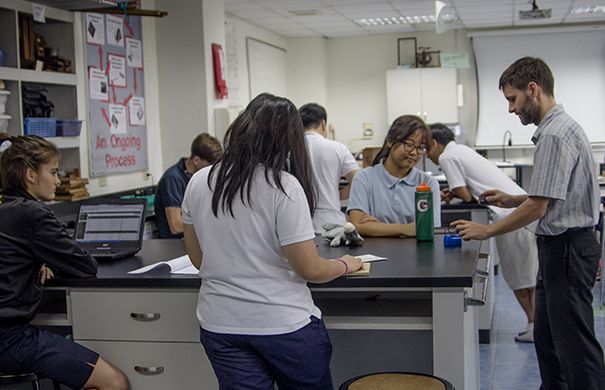When it comes to reaching the lost, few people think of missionary kids. After all, their parents are the ultimate Christians, right?
But according to TEAM missionaries Seth and Laura O’Day, the MK status as super Christian offspring can be exactly what hinders them from becoming devout believers themselves.
“They’ve gotten used to burying things … because it looks bad for their family if they’re obviously having a problem with something,” says Seth.
And what could look worse than an MK having doubts about God?
When MKs struggle with their faith, many would rather pretend than reach out for help. But at Faith Academy in Manila, Philippines , teachers like Seth and Laura are working to change that.
Faking the Faith

The majority of students at Faith Academy come from Christian families. But sometimes, being surrounded by Christians makes it tempting to fake faith rather than openly wrestle with doubts. Photo courtesy of Laura O’Day
Faith Academy was founded as an MK school and has grown to include children of ambassadors, international business people, and local Filipinos.
MK or not, most students have some kind of Christian background, but Laura says their responses to that background vary widely.
“Have they made it their own? Or are they running away from it at full speed, or just plodding along and ignoring things, or what?” Laura says.
In a school culture where everything revolves around Christianity, it’s easy to fake at least a lukewarm faith. That’s why true relationships with students are vital to discovering what’s really happening inside.
Opening Doors through Friendship
Laura and Seth have both taught in the States, so they were surprised at the vast opportunities to build relationships with students at Faith Academy.
“It would be unthinkable for an American teacher to friend a student on Facebook,” Seth says. “Yet, that is rather common at Faith Academy because the teachers are all friends with your parents, and you might hang out with them after school, or … they might come to your house for dinner.”
The O’Days have made a point of taking on extracurricular roles within the school.
Laura teaches French but has also coached the school’s academic bowl team on the side. In addition to teaching science, Seth has served as a class advisor, helping students elect class governments, hold fundraisers and organize special events.
“[Students] would often come to me if they had things … they needed to talk about,” Seth says. “They knew that they could talk to me because I care about them and their class.”

In and out of the science classroom, Seth is thinking about how he can point students to Christ. Photo courtesy of Laura O’Day
When bullying broke out in one class, Laura and other teachers used their relationships to guide students through exercises of restoration and healing.
Through the process, it came out that one of the bully ringleaders was going through a difficult transition with her family. She didn’t know how to handle it and was taking it out on her classmate.
With their teachers’ help, the students not only welcomed the victim back into the fold but also extended grace to the bullies.
“As those students … moved into high school, the community in that class was pretty remarkable because they had walked through that together,” Laura says.
Building True Faith
As the O’Days build relationships with students, God continues to open doors for discipleship. Ultimately, they hope students will develop a faith that lasts outside Faith Academy.
“I know how easy it is for them to fall away from the faith,” Seth says. “I’ve seen the statistics. … So that’s the thing I pray most, … that they’ll be rooted and established and be able to weather the storms that are coming without giving up their faith. ”
So, when students are excited about their faith, Seth and Laura teach them how to live that out. When students are lukewarm, the O’Days show them how to heat up their faith.
And when students are struggling with their faith — or running away at full speed — the O’Days don’t let them pretend. Day by day, these missionaries invite students into the light, where they can know the healing grace of God.
The students may not become missionaries or be known for impressive piety, but with openness and honest discipleship, they can live full lives of faith that influence the world for Christ.




















